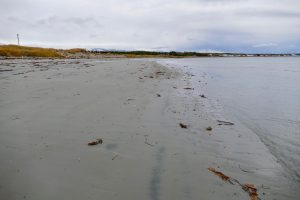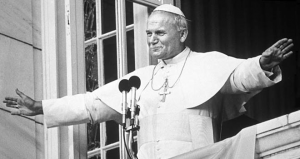HOMILY WEEK 29 04 – Year II
Awakening to God’s Power Within Us:
Optional Memorial of St. Pope John Paul II
(Eph 3:13-21; Ps 33; Lk 12:49-53)
*******************************************

Low tide at Cow Head, Nfld
During a retreat I was conducting for the priests of the Diocese of Corner Brook-Labrador in Cow Head, Newfoundland in October, 2019, I enjoyed walking the beach at low tide. Being a westerner, that phenomenon was new to me. One day as I walked, I noticed rivulets of water under my feet still running over the hardpacked sand towards the Gulf, and realized the tide was still going out. The next morning, as I prayed in my room looking out the window, I began to notice mini-waves of water rolling up the sand towards the shore, and realized the tide was coming back in. Sure enough, rocks of all sizes slowly disappeared as the water relentlessly moved towards high tide.
This phenomenon of high and low tides became an invitation for me to be more aware of and appreciative of the power of God’s love and the Spirit of Jesus dwelling us.
The first reading is all about the power of faith, hope and love. Paul is suffering imprisonment for the sake of the gospel, yet he turns that suffering into something positive, the opportunity to evangelize and strengthen his fellow believers. He reminds them that Christ is dwelling within them, they are grounded in God’s love, they know the love of Christ, and they have the power of the Spirit within them, helping them to see the breadth, width, depth and length of God’s love that surpasses knowledge and is the fullness of God. He then adds God’s power working within us accomplishes far more than we can imagine. He is alluding to the divinization and transformation that is ours in Christ.
That faith is the source of hope giving us the strength to endure suffering and persecution like St. Paul. That suffering and persecution is what Jesus is alluding to in the gospel when he speaks of the divisions that will happen, even within families, because of him. It is not that Jesus brought division – division will happen because of the evil in our world and because his presence necessitates a choice for or against him.
There are two words describing the force of evil in our world: Satan and Devil. The word “devil” comes from the Greek “diablos” which means “to divide.” So, wherever there is a divisive force in our lives and society, it is the devil who is at work, trying to divide and conquer. On the other hand, Satan seeks to gather people together, but for an evil purpose – to kill and destroy. Think gangs, ISIS, Boko Haram, any mindless mob bent on destruction. That is a Satanic force, seeking only to harm. And evil as Satan and the devil is always at work in our world, wreaking havoc in the form of destruction and division.
It is said more Christians are being persecuted around the world today than ever before. Once in a while we come across an account of someone who has had an experience of Jesus within a Muslim or Hindu family, the choice they made for Christ, and the subsequent persecution they underwent, often having to escape for their lives. The latest is a captive of Boko Haram who, when asked if she was a pagan (apparently her captors refer to all non-Muslims as pagans), honestly stated she was Christian. Those who were released urged her to renounce her faith so she could leave with them, but she refused to do so, and as a result, remains a captive.
John Allan Jr. is doing research on a book about Christians persecuted around the world. In his travels, he met a woman in Kenya who had many of her family members killed by Boko Haram. Yet her vibrant faith and joy amazed him. When he asked her how she could be that way after what happened to her, she replied the greatest gift God gave her was her faith in Jesus. They had taken most of her family – she was determined not to let them take away her faith, so she had forgiven them as Jesus taught us to do.
In the gospel, Jesus speaks of a baptism he has come to accomplish. That baptism alludes to the power of the Holy Spirit waiting to work within us through forgiveness and healing. That baptism is his passion, death and resurrection leading to our participation in the eternal life God wants to share with us. It is a spiritual spiral – passion, death and resurrection. When we become aware of some sin or defect of character within us, that is our passion. Praying about it and receiving forgiveness for any hurtful action because of it is our death. Letting it go and receiving the healing is our resurrection and transformation. It all depends on our faith in God’s love, and our humility to cooperate with that love.
The psalm reminds us of the goodness of God in all of creation, in spite of the presence of both satanic and diabolical forces in our world. I experienced a touch of that as I prayed one morning watching the tide roll in. Two seagulls landed on the water right in front of me, and proceeded to start dancing. They paddled in a tight circle for a while, just like they were doing the tango. Then suddenly, they turned in unison and swam side by side for a time, just like they were doing a waltz. Then they drifted apart and went their separate ways. I realized I had just been treated to a little taste of the goodness of God in all of creation, and felt joy in my heart.
 Today the church invites us to honor St. Pope John Paul II, born Karol Józef Wojtyla in Poland in 1920. He was ordained to the priesthood in 1946. In 1964, he was appointed Archbishop of Krakov by Pope Paul VI. Besides taking part in Vatican Council II (1962-1965) where he made an important contribution to drafting the Constitution Gaudium et Spes, Cardinal Wojtyla participated in all the assemblies of the Synod of Bishops. After the death of Pope John Paul I in 1978, the Cardinals elected him Pope at the Conclave of October 16, 1978 and he took the name of John Paul II. His love for young people brought him to establish the World Youth Days which occurred 19 times during his pontificate. In 1984, JP II became the first pope to step foot on Canadian soil when he launched a 12-day pastoral visit. John Paul II’s pontificate, one of the longest in the history of the Church, lasted nearly 27 years. He died on April 2nd, 2005, the vigil of Divine Mercy Sunday. JP II was canonized on April 27th, 2014 by Pope Francis. St John Paul II is the patron saint of World Youth Day. In Canada, April 2nd is known nationally as John Paul II Day.
Today the church invites us to honor St. Pope John Paul II, born Karol Józef Wojtyla in Poland in 1920. He was ordained to the priesthood in 1946. In 1964, he was appointed Archbishop of Krakov by Pope Paul VI. Besides taking part in Vatican Council II (1962-1965) where he made an important contribution to drafting the Constitution Gaudium et Spes, Cardinal Wojtyla participated in all the assemblies of the Synod of Bishops. After the death of Pope John Paul I in 1978, the Cardinals elected him Pope at the Conclave of October 16, 1978 and he took the name of John Paul II. His love for young people brought him to establish the World Youth Days which occurred 19 times during his pontificate. In 1984, JP II became the first pope to step foot on Canadian soil when he launched a 12-day pastoral visit. John Paul II’s pontificate, one of the longest in the history of the Church, lasted nearly 27 years. He died on April 2nd, 2005, the vigil of Divine Mercy Sunday. JP II was canonized on April 27th, 2014 by Pope Francis. St John Paul II is the patron saint of World Youth Day. In Canada, April 2nd is known nationally as John Paul II Day.
The Eucharist is a foretaste of our heavenly banquet that has sustained martyrs for over two thousand years, making present the love of God in Christ lived out through his passion, death and resurrection. May our celebration ground us in a faith and love strong enough to face whatever challenges and difficulties we might face in life with joy and magnanimity.



